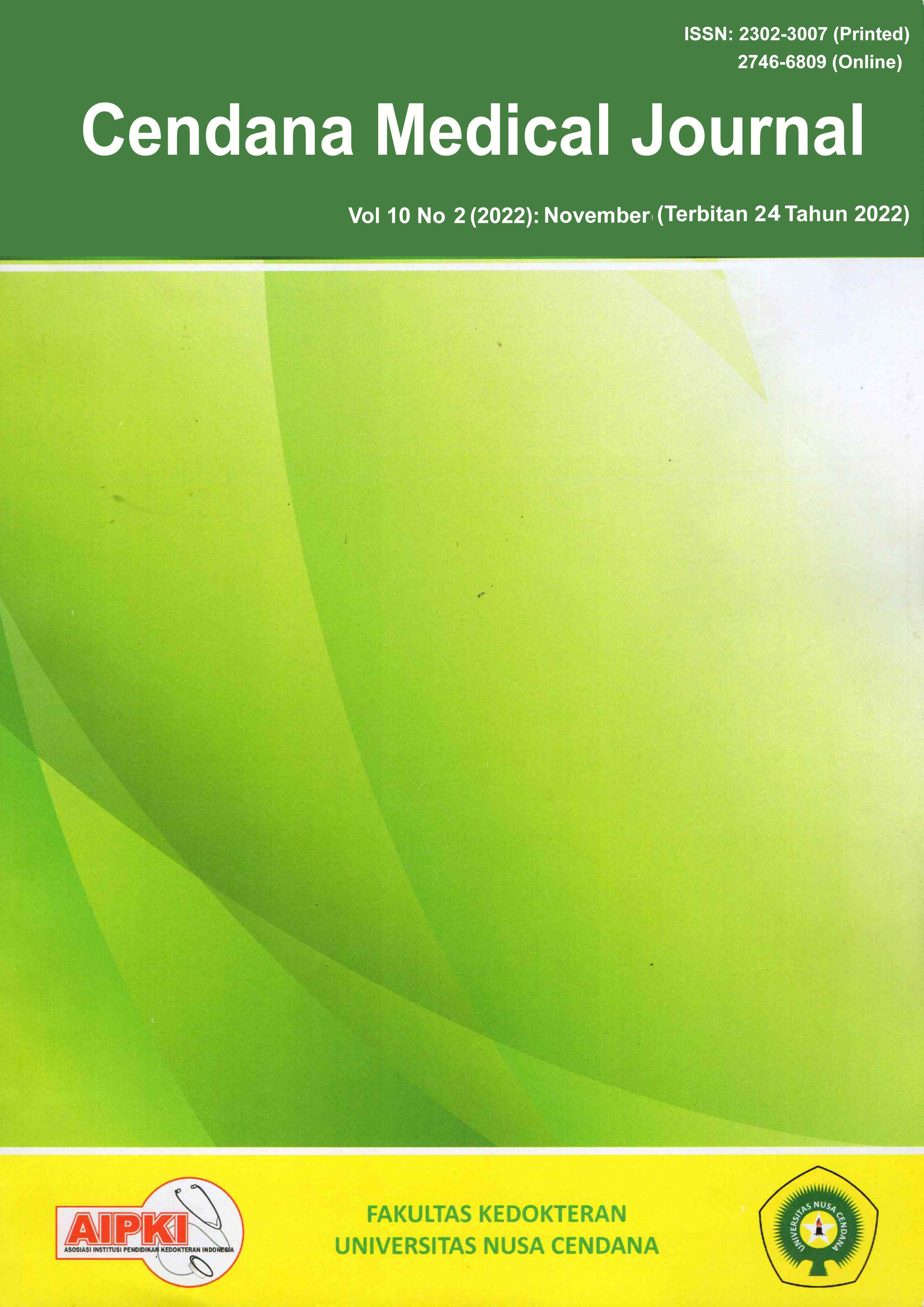THE INFLUENCE OF THE COVID-19 PANDEMIC ON THE SELF-CONFIDENCE OF CLINICAL CLERKSHIP STUDENTS, FACULTY OF MEDICINE, NUSA CENDANA UNIVERSITY
Abstract
Background: COVID-19 first appeared in Wuhan Province, China in 2019 to the extent that it spread worldwide including Indonesia. COVID-19 cases have declined but vaccine targets have not been fully met, and the number of health workers who died during the COVID-19 pandemic has been one of the things that impact the confidence level of the clinical clerkship students.
Objective: This study aims to identify the effect of the COVID-19 pandemic on the confidence of clinical clesrkship students at the faculty of medicine, Nusa Cendana University.
Methods: The research was conducted analytically observational with a cross sectional approach conducted on 88 respondents of the Faculty of Medicine of Nusa Cendana University using google form. Sampling is performed using stratified random sampling techniques. This study was analyzed univariate and bivariate using Linear Regression tests.
Result: Out of 88 respondents, 83 (94.3%) agreed to have sufficient confidence, 4 respondents (4.5%) strongly agreed to have sufficient confidence, and 1 respondent (1.1%) did not agree to have sufficient confidence. Meanwhile, 87 people (98,9%) were concerned about the pandemic of COVID-19 and 1 person (1,1%) who were not concerned about the pandemic of COVID-19 with the results of the bivariate analysis of both variables were obtained a p= 0,070.
Conclusion: There was no significant effect from the COVID-19 pandemic on the confidence of clinical clesrkship students at the faculty of medicine, Nusa Cendana University.
Downloads
References
2. CSSEGIS and Data/COVID-19: Novel Coronavirus (COVID-19) Cases.2021
3. COVID-19 NTT – Sebaran Data. 2021.
4. Statistik Kematian Tenaga Kesehatan Indonesia. May 16, 2022
5. Data Vaksinasi COVID-19. May 15, 2022
6. Vaksin Dashboard. May 15, 2022
7. Asla De Vega, Hapidin, & Karnadi, Pengaruh Pola Asuh dan Kekerasan Verbal terhadap Kepercayaan Diri, Jakarta: Jurnal Obsesi, 2019
8. World Health Organization.Naming the coronavirus disease (COVID-19) and the virus that causes it. 25 Juli 2021
9. Ahn, D. G., Shin, H. J., Kim, M. H., Lee, S., Kim, H. S., Myoung, J., Kim, B. T., & Kim, S. J. Current status of epidemiology, diagnosis, therapeutics, and vaccines for novel coronavirus disease 2019 (COVID-19).Journal of Microbiology and Biotechnology.2020;30(3):313–324.
10. World Health Organization. Coronavirus disease (COVID-2019) Situation reports-42. 25 April 2021
11. World Health Organization. “WHO Coronavirus Disease (COVID-19)”.https://covid19.who.int/.Accessed July 23, 2021
12. Satgas Penanganan COVID-19. “Peta Sebaran COVID-19” July 23, 2021
13. Astuti, I., & Ysrafil. Severe Acute Respiratory Syndrome Coronavirus 2 (SARS-CoV-2): An overview of viral structure and host response. Diabetes and Metabolic Syndrome: Clinical Research and Reviews, 2020;14(4):407-412.
14. Kemenkes RI. (2020). Waspada Virus Corona. 25 Juli 2021
15. Bender, dkk. Pesan dan Kegiatan Utama Pencegahan dan Pengendalian Covid-19 di Sekolah. Education Unicef NYHQ.2020
16. World Health Organization. Modes of transmission of the COVID-19 virus.
25 Juli 2021
17. Kementrian Kesehatan RI.Pedoman Pencegahan dan Pegendalian Coronavirus Disease (COVID-19).Direktorat Jenderal Pencegahan dan Pengendalian Penyakit.Jakarta. 2020
18. Center for Disease Control and Prevention (CDC) . People Who Are at Higher Risk for Severe Illness. 24 Juli 2021
19. Deni & Ifdil.Konsep kepercayaan diri remaja putri. 2016.
20. Andayani, B & Afiatin, T.. Konsep Diri, Harga Diri, dan Kepercayaan Diri Remaja. Jurnal Psikologi. 2014;23:23-30.
21. Ghufron, M. N, & Risnawati, R.. Teori-Teori Psikologi. Yogjakarta: Ar-ruzz Media. 2014
22. Vandini.Peran kepercayaan diri terhadap prestasi belajar matematika Universitas Sumatera Utara. Program Studi Teknik Informatika,Fakultas Teknik, Matematika, dan IPA Universitas Indraprasta PGRI. Jurnal Pendidikan Indonesia. 2016;2(2):43-52
23. Syam, A & Amri. Pengaruh Kepercayaan Diri Berbasis Kaderisasi IMM Terhadap Prestasi Belajar Mahasiswa. Jurnal Biotek. 2017; 5: 93-94.
24. Suhron, M. Asuhan keperawatan Jiwa Konsep Self Esteem.Jakarta: Mitra Wacana Media. 2017
25. Syafrullah, Rokayah. C, Nurdin. R . Hubungan kepercayaan diri dengan tingkat kecemasan pada mahasiswa kelas alih tranfer program sarjana keperawatan. Jurnal Keperawatan Jiwa, 2017;5(2):72-76.
26. FK UMSU. Panduan Akademik Fakultas Kedokteran Universitas Muhammadiyah Sumatera Utara. 2015:1-47.
27. Kötter T, Wagner J, Brüheim L, Voltmer E. Perceived Medical School stress of undergraduate medical students predicts academic performance : an observational study. BMC Medical Education. 2017:1-6.
28. Dunham L, Dekhtyar M, et al. Medical Student Perceptions of the Learning Environment in Medical School Change as Students Transition to Clinical Training in Undergraduate Medical School Medical Student Perceptions of the Learning Environment in Medical School. Teach Learn Med. 2017;0(0):1-9.
29. Anugrah, Sari. Pembelajaran Jarak Jauh Pada Kepaniteraan Klinis Program Studi Profesi Dokter Di Rumah Sakit Pendidikan.Jurnal JMJ.2021;9(2):220-229
30. Republik Indonesia. Peraturan Pemerintah Republik Indonesia No. 47 Tahun 2021 tentang Penyelenggaraan Bidang Perumahsakitan. 2021.
31. Rikomah, Setya Enti.Farmasi Rumah Sakit. Yogyakarta: Penerbit Deepublish;2017
32. Sastroasmoro, Sudigdo; Ismael, Sofyan.Dasar-Dasar Metodologi Penelitian Klinis.Jakarta : Sagung Seto.2011
33. Ismayanti.Angket Kepercayaan Diri Lauster. Disusun oleh Lauster (Ismayanti, 2003)
34. Konsil Kedokteran Indonesia (KKI). Standar Kompetensi Kedokteran Indonesia. 2012.
35. Sari, Nila Febriana. Kepercayaan Diri Tenaga Medis Yang Masih Bekerja Selama Masa Pandemi COVID-19. 2020;
Copyright (c) 2022 Cendana Medical Journal (CMJ)

This work is licensed under a Creative Commons Attribution-NonCommercial-NoDerivatives 4.0 International License.
Copyright Notice

This work is licensed under a Creative Commons Attribution 4.0 International License.

 Paula Beatric Alexis Sulla(1*)
Paula Beatric Alexis Sulla(1*)












